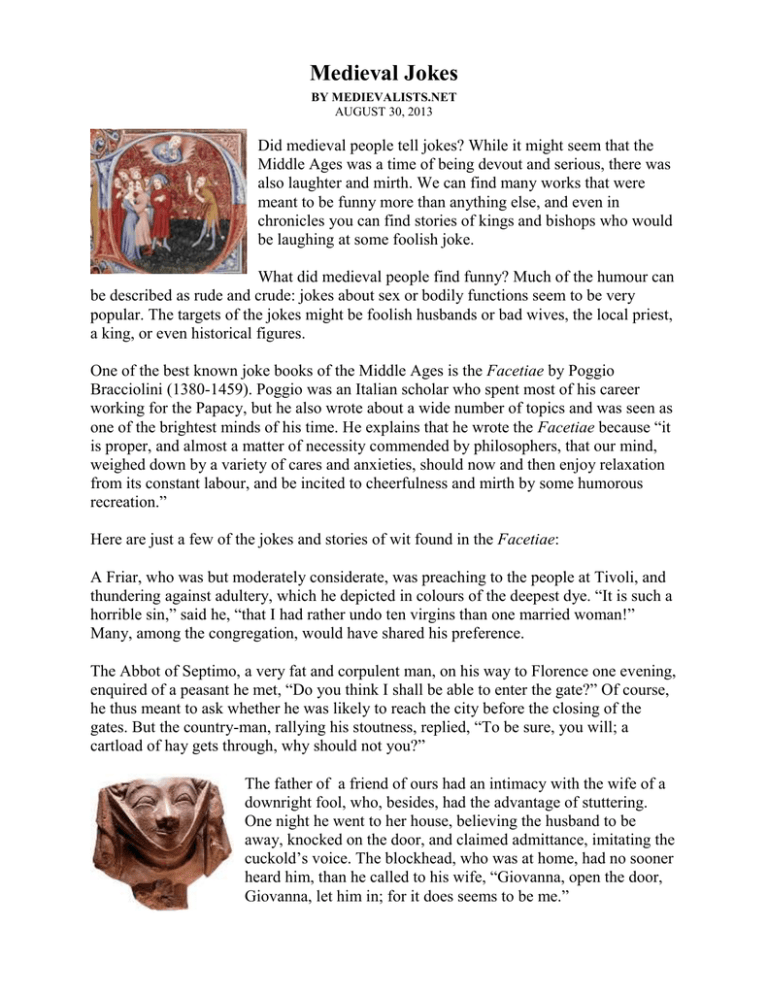Medieval Jokes: Humor in the Middle Ages
advertisement

Medieval Jokes BY MEDIEVALISTS.NET AUGUST 30, 2013 Did medieval people tell jokes? While it might seem that the Middle Ages was a time of being devout and serious, there was also laughter and mirth. We can find many works that were meant to be funny more than anything else, and even in chronicles you can find stories of kings and bishops who would be laughing at some foolish joke. What did medieval people find funny? Much of the humour can be described as rude and crude: jokes about sex or bodily functions seem to be very popular. The targets of the jokes might be foolish husbands or bad wives, the local priest, a king, or even historical figures. One of the best known joke books of the Middle Ages is the Facetiae by Poggio Bracciolini (1380-1459). Poggio was an Italian scholar who spent most of his career working for the Papacy, but he also wrote about a wide number of topics and was seen as one of the brightest minds of his time. He explains that he wrote the Facetiae because “it is proper, and almost a matter of necessity commended by philosophers, that our mind, weighed down by a variety of cares and anxieties, should now and then enjoy relaxation from its constant labour, and be incited to cheerfulness and mirth by some humorous recreation.” Here are just a few of the jokes and stories of wit found in the Facetiae: A Friar, who was but moderately considerate, was preaching to the people at Tivoli, and thundering against adultery, which he depicted in colours of the deepest dye. “It is such a horrible sin,” said he, “that I had rather undo ten virgins than one married woman!” Many, among the congregation, would have shared his preference. The Abbot of Septimo, a very fat and corpulent man, on his way to Florence one evening, enquired of a peasant he met, “Do you think I shall be able to enter the gate?” Of course, he thus meant to ask whether he was likely to reach the city before the closing of the gates. But the country-man, rallying his stoutness, replied, “To be sure, you will; a cartload of hay gets through, why should not you?” The father of a friend of ours had an intimacy with the wife of a downright fool, who, besides, had the advantage of stuttering. One night he went to her house, believing the husband to be away, knocked on the door, and claimed admittance, imitating the cuckold’s voice. The blockhead, who was at home, had no sooner heard him, than he called to his wife, “Giovanna, open the door, Giovanna, let him in; for it does seems to be me.” A Florentine I was acquainted with was under the necessity of buying a horse in Rome, and bargained with the dealer, who asked him twenty-five gold ducats, too high a price; he offered to pay fifteen ducats cash, and to owe the rest; to which the dealer agreed. On the following day, when asked for the balance, the buyer refused, saying, “We must keep our agreement: it was settled between us that I was to be your debtor; I should be so no longer if I were to pay you.” Several persons were conversing in Florence, and each was wishing for something that would make him happy; such is always the case. One would have liked to be the Pope, another a king, a third something else, when a talkative child, who happened to be there, said, “I wish I were a melon.” “And for what reason?” they asked. “Because everyone would smell my bottom.” It was usual for those who want to buy a melon to apply their noses underneath. An inhabitant of Perugia was going along the streets, wrapped in thought and melancholy, and, being met by someone who enquired the motive of his concern, replied that he owed money which he could not pay. The man responded, “Leave that anxiety to your creditor.” Francesco Quartnense, a Florentine merchant, resided in Genoa with his wife and family. His children were thin and lanky, while those of the Genoese are generally healthy and hardy. He was asked one day why his children were so spare and of such a weak constitution, it being the reverse with the young Genoese. “The reason is easily given, ” he said. “I work alone at manufacturing my children, but you have quite a number of assistants in the making of yours.” It is fact that, soon after their wedding, the Genoese take again to the sea, and leave their wives, for many years in succession, to the care of other men, as they say. One of our fellow citizens, a very witty man, was labouring under a painful and lengthy illness, was attended by a Friar who came to comfort him, and, among other words of solace, told him that God thus especially chastens those he loves, and inflicts his visitations upon them. “No wonder then,” retorted the sick man, “that God has so few friends; if that is the way he favours them, he ought to have still less.” A young Florentine was going down to River Arno with one of those nets in which they wash wool, and met a frolicsome boy, who, out of fun, asked him what birds he was going to catch with that net of his? “I am going to the Brothel’s outlet,” replied the youth, “to spread my net there, and catch your mother.” “Mind you search the place carefully,” retorted the boy, “for you will be sure to find yours there also.”


